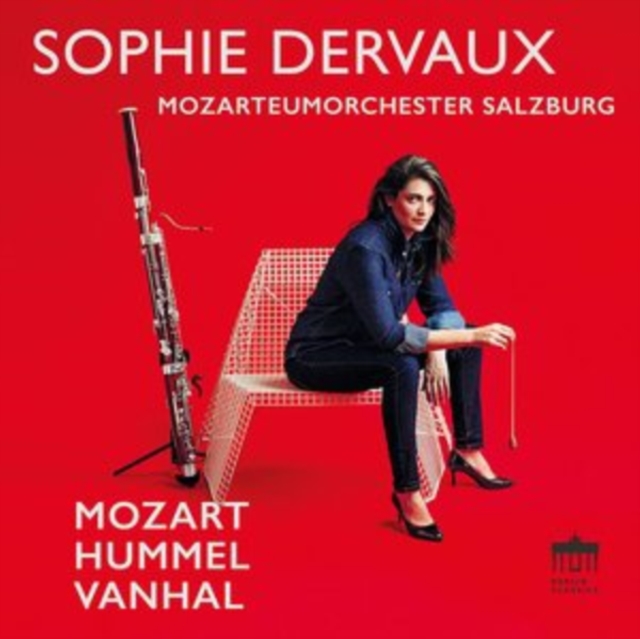 Mozart, Hummel and Vanhal – Bassoon Concertos Sophie Dervaux (bassoon/conductor), Mozarteumorchester Salzburg (Berlin Classics)
Mozart, Hummel and Vanhal – Bassoon Concertos Sophie Dervaux (bassoon/conductor), Mozarteumorchester Salzburg (Berlin Classics)
The performance of the Hummel Grand Concerto for bassoon from 1805 here is just superb. French-born Sophie Dervaux (née Dartigalongue, just like the armagnac) is principal bassoon in the Vienna Philharmonic, and she has said of the instrument she plays: “What makes the bassoon special for me is this flexibility, this warmth in the sound.” Her previous CD for Berlin Classics included some classics of the French song repertoire (try the gorgeous “À Chloris” by Reynaldo Hahn). On the new disc we find more persuasive communication, well-judged pacing and graceful, warm-toned playing. She also makes her debut as conductor on this disc, directing a chamber-sized Salzburg Mozarteum Orchestra in all three performances from the Viennese concerto repertoire. A comparison with the 1989 Thunemann/ASMF/Philips version of the Hummel, recorded in 1989, brings out quite how communicative, personal and affecting Dervaux’s playing is. These are virtuosic works, and as she whizzes freely up and down the compass of the instrument, the reassuring clickety-clack of her Püchner instrument is often audible.
Mozart’s concerto dates from 1774, when the composer was 18. Köchel’s catalogue speculates on the existence of three more concertos written by the teenager for the same dedicatee during the following year, but this is the only one to have survived. Twelve years later, the material of the slow movement resurfaced – a tone lower – as “Porgi Amor” in Figaro. I found the balance between soloist and orchestra curious, and the Thunemann comparison is instructive here as well. Whereas Neville Marriner placed his bassoonist as the hero who is inevitably going to win the battle with the orchestra (ASMF are also gentler, and occasionally more alert than the Mozarteum players), here the solo instrument is slightly recessed, as if Dervaux welcomes those moments when the orchestra – which she is conducting – can engulf her as soloist.
Of the three pieces on this disc, one is a premiere recording: a C major Concerto by Johann Baptist Vanhal, which as the sleeve note points out, shares the same orchestration as the Mozart concerto, and was presumably written as an historic example of the “recommended if you like” principle. By any standards it is a slight work, and Vanhal is happy to supply twiddly phrases and stock, scale-based material to keep the soloist busy, rather than melodies with a bit of expressive heft for her to work with. Sophie Dervaux sees herself an ambassador for the bassoon, and this whole disc really is a wonderful advertisement for how good a bassoon can sound. She really does make “the clown of the orchestra” sing. - Sebastian Scotney
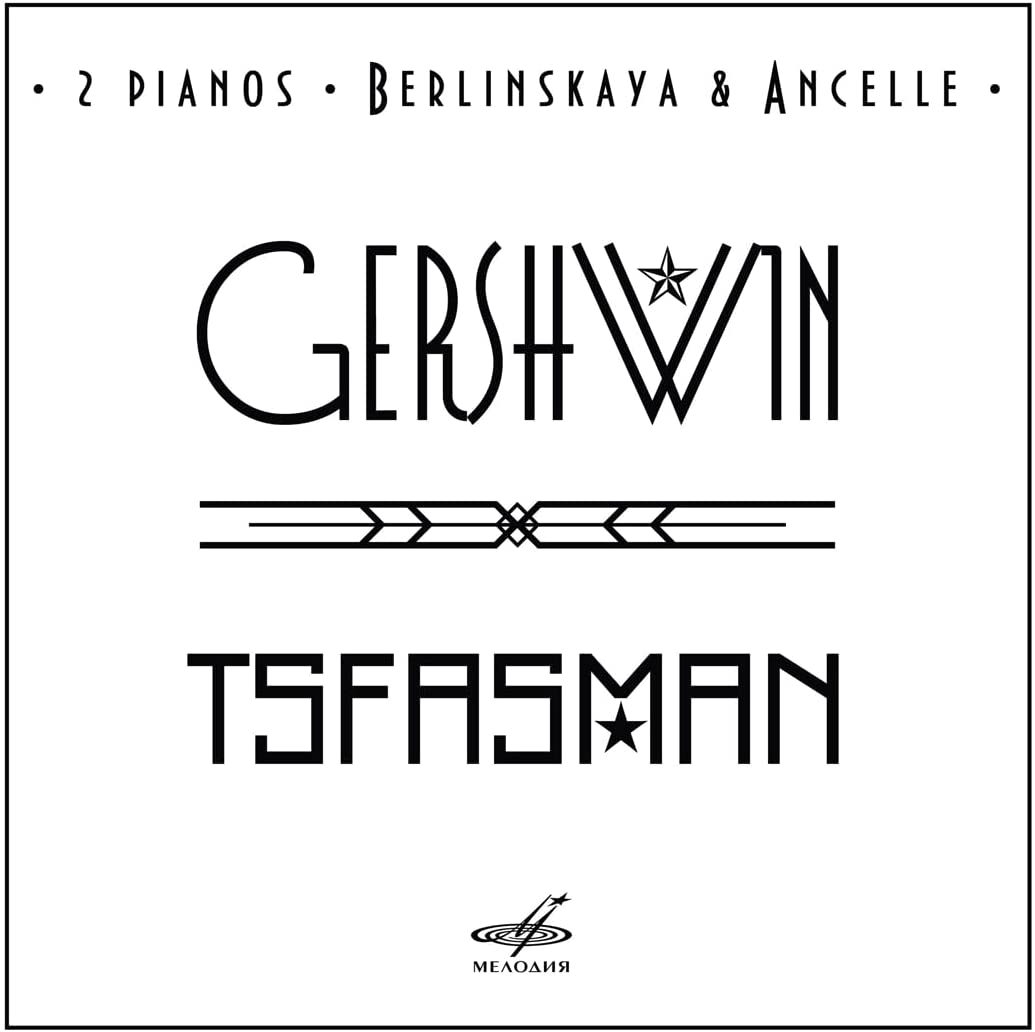 Music for Two Pianos by Gershwin and Tsfasman Ludmila Berlinskaya and Arthur Ancelle (Melodiya)
Music for Two Pianos by Gershwin and Tsfasman Ludmila Berlinskaya and Arthur Ancelle (Melodiya)
Alexander Tsfasman? Born in Ukraine in 1906, he gave the first Russian performer of Gershwin’s Rhapsody in Blue in 1945, his career as a prominent jazz pianist and composer largely under the radar to Western audiences. Ludmila Berlinskaya and Arthur Ancelle stress the musical common denominator which Tsfasman and Gershwin shared, namely that “their jazz is written on paper and comes from classical music roots.” Tsfasman’s delectable four-part Jazz Suite makes for a superb introduction, heard here in a two-piano transcription by Igor Tsyganov. The opener, “Snowflakes”, is an earworm, its language placing it firmly at the Gershwin end of the 20th century musical spectrum, perhaps unsurprising given that both Tsfasman and Gershwin shared similar Jewish roots. Ancelle’s arrangements of four Tsfasman songs are fun, the moods veering from skittish (“Jolly Night”) to bluesy sentiment (“Always with you”). And there’s an inventive Tsfasman fantasy on Gershwin’s “The Man I love”.
Essential listening, and the disc also contains a decent selection of Gershwin two-piano transcriptions. “Someone to Watch Over Me” is deliciously done, and there’s a fun arrangement of the Three Preludes. Best is Gershwin’s own transcription of his variations on “I Got Rhythm”, a wonderfully inventive work, all too rarely performed. The harmonic boldness reflects the composer’s studies with Joseph Schillinger, though we never lose sight of the original theme. This performance is as idiomatic as any you’ll find on disc; you can sense Berlinskaya and Ancelle grinning. All great fun – you need this CD.
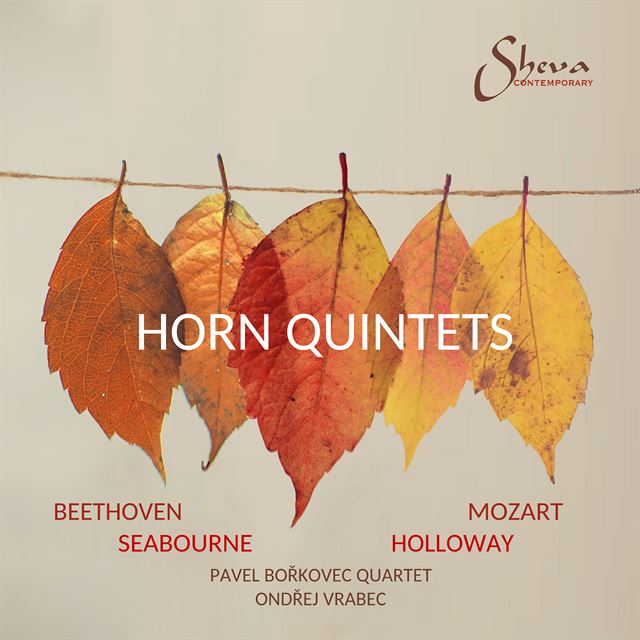 Horn Quintets – music by Beethoven, Mozart, Holloway and Seabourne Ondřej Vrabec (horn), Pavel Bořkovec Quartet (Sheva Contemporary)
Horn Quintets – music by Beethoven, Mozart, Holloway and Seabourne Ondřej Vrabec (horn), Pavel Bořkovec Quartet (Sheva Contemporary)
Beethoven completists need this disc because it contains a striking arrangement for horn and string quartet of the early op. 17 Horn Sonata. Composed in 1800 for the Bohemian virtuoso Giovanni Punto (born Jan Vaclav Stich), it’s an ungainly piece with a fiendish piano part, and the sonata sounding much more palatable in this incarnation. Cellist Sebastian Comberti’s recent edition is based on an 18th century string quintet transcription made by one Carl Khym. Horn and solo strings are nicely balanced, and this compact work doesn’t outstay its welcome. Ondřej Vrabec, principal horn of the Czech Philharmonic, is teamed here with the Pavel Bořkovec Quartet; the playing is exquisite, Vrabec’s recognisably Czech timbre balm for the ears. More memorable is Mozart’s sublime K407 Quintet, a technically demanding companion piece to the four horn concertos, its closing Rondo in 2/4 rather than the usual 6/8. Vrabec’s performance, on a modern valved horn, is as good as any I’ve heard on disc. While not as profound as Mozart’s sublime K581 Clarinet Quintet, it’s a lovely work, Vrabec taking wing in the tender slow movement.
Two contemporary couplings, both written for Vrabec, are striking. Peter Seabourne’s horn quintet Fall is a dark four-movement work taking inspiration from a turbulent monoprint by Seabourne’s late wife. Horn and strings trace an uneasy, twisting path, finding some peace in a lyrical, melancholy slow movement. The final bars are bleak and inconclusive. The Horn Quintet by Seabourne’s friend and teacher Robin Holloway is more outward looking, the first movement’s long, lyrical lines fearlessly projected by Vrabec. Holloway knows how demanding his writing is, giving the horn a lengthy respite for most of the second movement. The finale’s slow central section is a wordless setting of a sonnet by Lord Edward Herbert (brother of George), horn and strings tracing every word, before Holloway throws in an upbeat coda. Vrabec’s charisma is irresistible; he plays both new pieces with a winning blend of swagger and humility.
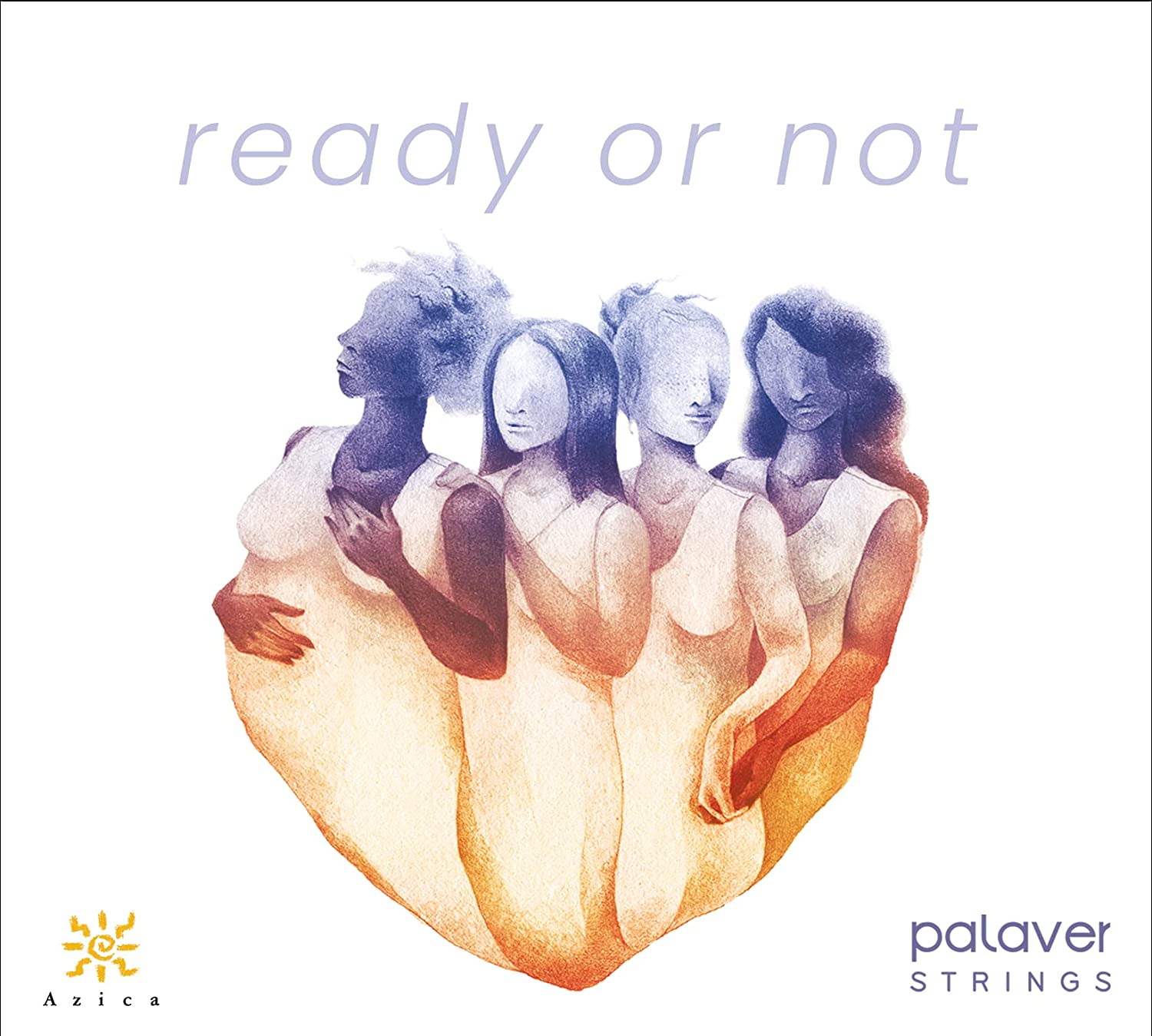 Palaver Strings: Ready or Not (Azica)
Palaver Strings: Ready or Not (Azica)
United Strings of Europe: Renewal Julian Azkoul (violin and director), Ruby Hughes (soprano) (BIS)
Two eclectic string collections have recently landed in the pile. Buy both. Portland-based Palaver Strings give us Ready or Not, a celebration of female composers. They open with Grażyna Bacewicz’s 1948 Concerto for String Orchestra, a compelling three-movement concerto grosso that’s among the last century’s most engaging string concertante works. Best to ignore the compliment paid by Bacewicz’s colleague Stefan Kisielewski (“…red-blooded… written with male-like creative power…”) and revel in the rhythmic energy and harmonic punch. It’s a masterpiece, well-served by Palaver’s seventeen players. Moving from Bacewicz to a tiny 16th century madrigal by Maddalena Casulana is a big leap, and Jesse MacDonald’s transcription works wonderfully, as does Barbara Strozzi’s “Lagrime mie” from a century later, sympathetically arranged by Adam Jacob Simon and sweetly sung by soprano Sophie Michaux.
Akenya Seymour’s Fear the Lamb commemorates black teenager Emmett Till, tortured and lynched in 1950s Mississippi. There’s a chilling passage where the players’ collective whistles allude to Till’s speech impediment, and a moving elegy, individual players given the chance to improvise. Bass Nate Martin’s solo is brilliant. And we get three tunes by local fiddlers Liz Knowles and Elizabeth Moore, the latter’s “Fore Street” an exuberant album closer. All superb, and warmly recorded.
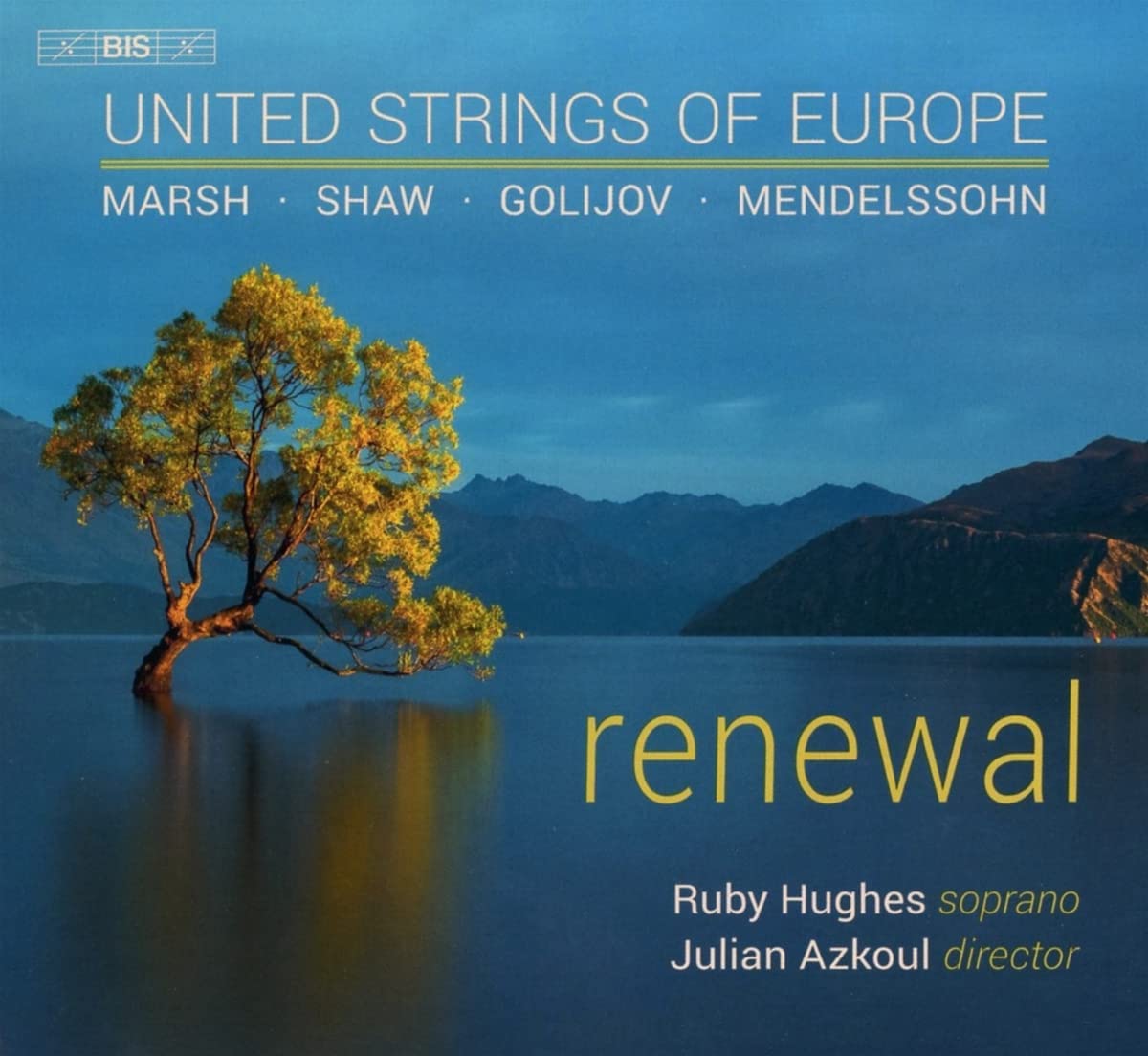 Julian Azkoul’s second disc with the United Strings of Europe is similarly diverse. The biggest work here is Azkoul’s adaptation of Mendelssohn’s dark F minor String Quartet, a late work composed after the death of his sister. The emotional extremes are more pronounced, Mendelssohn’s sublime slow movement sounding almost Mahlerian. The finale’s final chord is like a sharp punch. Joanna Marsh’s “In Winter’s House” was a commission for Tenebrae, Marsh’s harmonies easier to follow played by strings. "Entr’acte" by Caroline Shaw alludes to Classical minuet and trio form, inspired by Shaw hearing a performance of a Haydn quartet. Textures swell and thicken to magical effect, the return of four solo strings playing the central minuet’s theme at the close is brilliantly effective. Shaw’s "and the swallow" closes the disc, offering much-needed consolation after the Mendelssohn. Originally a setting of Psalm 84, this needs to be listened to through headphones, Shaw’s antiphonal effects mimicked by dividing the strings into two groups with the bass in the centre.
Julian Azkoul’s second disc with the United Strings of Europe is similarly diverse. The biggest work here is Azkoul’s adaptation of Mendelssohn’s dark F minor String Quartet, a late work composed after the death of his sister. The emotional extremes are more pronounced, Mendelssohn’s sublime slow movement sounding almost Mahlerian. The finale’s final chord is like a sharp punch. Joanna Marsh’s “In Winter’s House” was a commission for Tenebrae, Marsh’s harmonies easier to follow played by strings. "Entr’acte" by Caroline Shaw alludes to Classical minuet and trio form, inspired by Shaw hearing a performance of a Haydn quartet. Textures swell and thicken to magical effect, the return of four solo strings playing the central minuet’s theme at the close is brilliantly effective. Shaw’s "and the swallow" closes the disc, offering much-needed consolation after the Mendelssohn. Originally a setting of Psalm 84, this needs to be listened to through headphones, Shaw’s antiphonal effects mimicked by dividing the strings into two groups with the bass in the centre.
Osvaldo Golijov’s Three Songs, sung here by soprano Ruby Hughes, were originally scored for orchestra, this new string version embraced by the composer after hearing the USE play it. “Night of the Flying Horses” comes from the soundtrack to a Sally Potter film, taking in a Yiddish lullaby and a frenetic Gypsy gallop. Hughes is wonderful in the second song’s Galician lament and in the closer, Golijov turning a seven-line Emily Dickinson poem into a haunting lament. The United Strings of Europe will be performing the Golijov at Wilton's Music Hall on May 25 – do check them out. A wonderful album, and BIS’s warm, spacious sound is unobtrusively spectacular.















Add comment